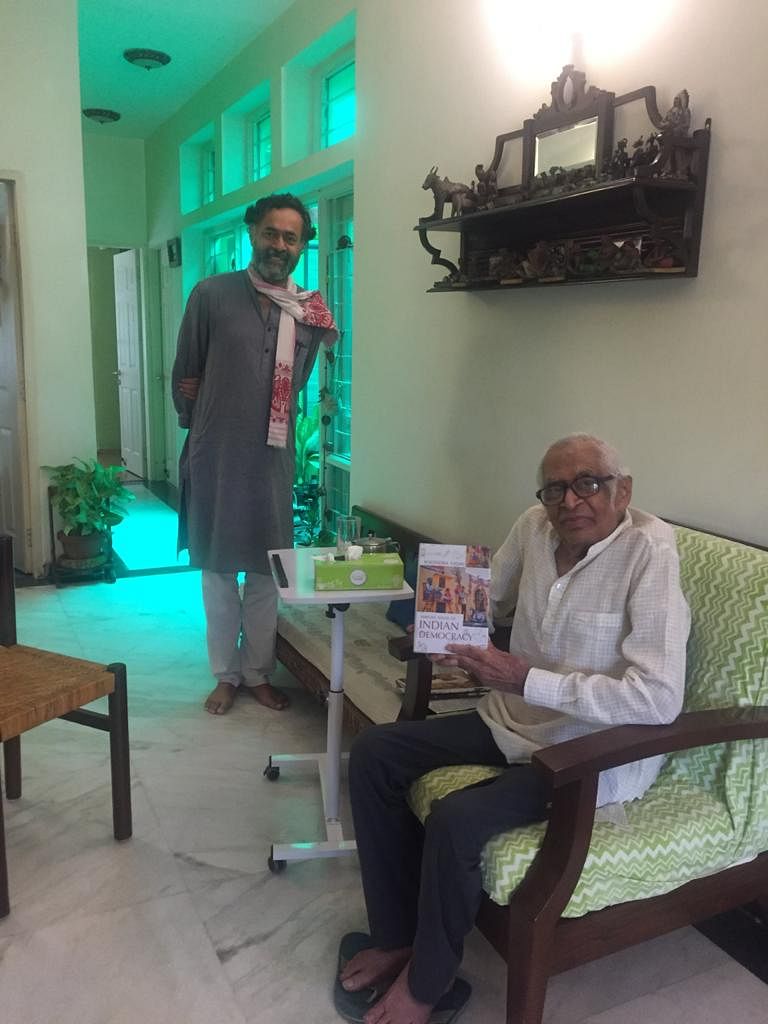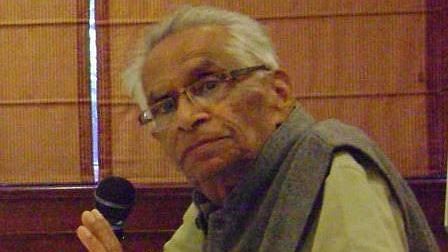With the passing away of Professor D. L. Sheth, India has lost a bridge that connected cutting-edge social science theory to frontline social and political activism. He was an outstanding theorist of India’s desi modernity, an institution builder who understood the peculiarity of Indian academia, a public intellectual who spoke up when very few did and a friend-philosopher-guide to all the andolanjeevis of the country. It is a very personal loss to me, because a meeting with him changed the course of my life and brought me to the Centre for the Study of Developing Societies, of which he was a founding member. For the two decades that I spent at the CSDS, he was my mentor.
Dhirubhai was one of those rare persons who combined passionate political idealism with deep sociological realism. This is not easy even in the best of times and in the most settled societies. In India’s post-colonial context, this enterprise is even more demanding. You are invited to play on a bewitching, almost impossible pitch; playing with a straight bat here is a sure guarantee of losing your wicket. You end up filtering the Indian experience through a largely received theory. Theorists who wish to make sense of the experience in their own terms, who insist on giving their name to the routines, the successes and the failures of their society, have to find ways of tackling the ball before it can spin or jump.
That is perhaps why Dhirubhai always played with a cross-bat, something that intrigued and amused me for long. He took delight in upsetting standard expectations, in making unsuspecting connections and, of course, in pointing out patterns in unintended consequences. He insisted that the word lafda is drawn from the French expression “La affair” (or was it the other way round?) This is no doubt a risky strategy, the theoretical equivalent of reverse sweep in cricket. Theory has to jump ahead of available evidence, old and familiar concepts have to perform new tasks, new concepts have to be conjured up at short notice. It did not work all the time. I used to tease him when his theoretical speculation did not match evidence on the ground, when his confident election forecasts failed. The amazing thing of course was how often and how well he succeeded. Dhirubhai connected Indian reality to inherited (and largely Western) social science, hard-boiled realism to romantic ideals, theory to evidence, everyday events to a larger frame.
He connected ivory tower theorisation to the world of social and political activism. This connect was not limited to his writings. Along with Professor Rajni Kothari and Vijay Pratap, he was the true inspiration behind Lokayan, a unique institutional experiment in setting up a sustained dialogue between activists and social scientists. This dialogue shaped some of the finest social scientists like Harsh Sethi and Shiv Vishwanathan, and also influenced some of the most reflective activists like Medha Patkar, Smitu Kothari, Rajni Bakshi, and Rajendra Ravi. Along with Professor Rajni Kothari and other colleagues at CSDS, Dhirubhai was active in resisting Indira Gandhi’s Emergency and in investigating and exposing the guilty during the anti-Sikh riots in 1984. He served as the president of Peoples’ Union for Civil Liberties (PUCL).
Also read: Dhirubhai Sheth, former director of CSDS, passes away at 85
Firm on caste-based quota
The one public intervention that brought his role to limelight was his defence of caste-based reservations. During Mandal-1 and Mandal-2, he was among the very few sociologists who stood for OBC reservations and offered sophisticated defence of the policy of affirmative action. Not because he looked at all reality only through the prism of caste. Funnily, many sociologists who saw nothing but caste in Indian villages turned around during the Mandal debate and said caste could not be the basis of job reservations. Dhirubhai, who readily acknowledged the role of gender and class as well, was quite firm in basing the policy of reservations on caste. In retrospect, Professor Sheth was the saving grace of Indian social science during the Mandal debates. He served as the first Member (Social Scientist) on the National Commission of Backward Classes.
For all his passionate activism, Dhirubhai hated political correctness and would often make fun of Left, secular and progressive intelligentsia. He was equally dismissive of Gandhians of the totalitarian variety (‘Gandhian Pol Potism’ as he would call it) and the RSS ideologues. He suspected grand ideological constructs, their normative presumptions about human behaviour, their complete disregard for choices and the will of the real life human beings.
This is what enabled him to overcome ideological binaries of our times. He could combine a defence of minority rights with a critique of secularism; his passion for civil rights and diversity with a defence of nation-state, nationalism and national security apparatus; a robust defence of caste-based reservation with a non-essentialism view of caste; a recognition of the salience of grassroots movements with unwavered focus on mainstream political parties; a critique of liberal democracy at the global level with a commitment to deepening of institutions of liberal democracy in our context; and, a critique of political globalisation with appreciation of potentials of economic globalisation, market, consumerism. An argument with him, often combative, was an invitation to a thought experiment where ideological certainties were being challenged, ideological models blown to bits. If history shows scant respect to ideological fantasies, so did Dhirubhai.
Also read: This Hindi book on Indian secularism could have exposed liberals, but it was ignored
My mentor at every step
His bridging of theory and action could be seen in his practice of institution building. He was among the founders of the CSDS, served as its Director for a term and was on its Board of Governors for long. But more than these formal positions, he was the custodian of the idea of CSDS. He envisioned, planned and strategised ways of keeping the Centre alive with fresh ideas and young blood. One of those plans involved bringing me to the CSDS. I met him in a seminar at the Indian Institute of Advanced Studies, Shimla in 1992. I was at the Panjab University, Chandigarh, at the cusp of a professional and personal transition, tired of teaching abstract and disconnected political philosophy and planning to quit academia in order to settle down in my village.

A meeting with the great Professor Sheth was a big thing for me. He was amazingly accessible, happy to spend a long time and willing to see something valuable in my interest in election surveys, something all my colleagues thought was a scandal. Over the next few months, he dissuaded me from quitting academia, asked me to give a seminar at CSDS, which was followed by an invitation to join the faculty there. Once I joined the Centre, he was my mentor and the source of support for relaunching the election studies programme. He was the inspiration behind Lokniti, the CSDS’ research programme on comparative democracy and also the longest surviving network of political scientists.
When I jumped into full-time politics, I consulted him again. This time he did not dissuade me. “Don’t give up writing,” he advised me. I met him last year to present him with a copy of my book Making Sense of Indian Democracy. He was already very frail, fading away. But I caught a twinkle in his eyes that was very Dhirubhai-like.
Yogendra Yadav is the national president of Swaraj India. Views are personal.
(Edited by Prashant Dixit)



